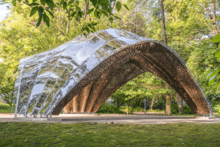Noticias y eventos

2021-10-11 10:00 Uhr
New avenues in architecture
Exolon Group supports interdisciplinary sustainable construction project
Munich/Freiburg, 12 October 2021. The botanical garden at the University of Freiburg has a new attraction: the livMatS pavilion, which combines sustainable building materials, architecture and digital technologies. This unique structure has been created in an interdisciplinary collaboration between the universities of Stuttgart and Freiburg. The Exolon Group supported the project with polycarbonate solid sheets.
The pavilion is not only an attractive venue, but also an example of a sustainable, resource-efficient alternative to conventional construction methods and is thus a landmark for sustainability in architecture. This is because it is the first building in which the supporting structure consists exclusively of robotically wound flax fibres. The design transfers principles from nature into architecture and enables a light yet stable construction. This weighs just 1.5 tonnes.
A polycarbonate skin protects the flax fibres from environmental influences, such as direct UV radiation and moisture from rain or snow. 220 square metres of Exolon® UV polycarbonate solid sheets with a thickness of 10 millimetres form the weather protection cover and, thanks to their easy formability, adapt to the curved lines of the natural fibre elements. The single-variety plastic is fully recyclable and can therefore be returned to the recyclable material cycle after use. Another aspect of the choice of material is its ease of processing and thermoforming.
The structure was created by means of interdisciplinary collaboration between architects and engineers from the ITECH master’s degree course at the Cluster of Excellence in Integrative Computational Design and Construction for Architecture (IntCDC) at the University of Stuttgart and biologists from the Cluster of Excellence in Living, Adaptive and Energy-autonomous Material Systems (livMatS) at the University of Freiburg.
The pavilion blends naturally into the surroundings of the Botanical Garden in Freiburg and will be used as a venue for the University of Freiburg in the next five years as part of the concept “Learning from Nature in Nature”.
More about the livMatS pavilion:
https://www.itech.uni-stuttgart.de/itech-studio-projects/livmats-pavilion/
Pictures:
LivMatS Pavillon: Exterior
©ICD/ITKE/IntCDC Universität Stuttgart, Rob Faulkner
Exolon Group is a leading supplier of solid and multiwall sheets for a wide range of innovative applications. The medium-sized group of companies develops, produces and distributes Exolon® brand polycarbonate sheets, Axpet® and Vivak® polyester sheets as well as Exoblend® brand opaque blend sheet material made of high-quality plastic.
The Exolon Group is characterised by 40 years of accumulated expertise in the extrusion of thermoplastic sheets and an extensive product portfolio. The products can be found, amongst other things, in construction, visual communication, industry and LED applications. The material is manufactured in accordance with consistently high-quality standards at production facilities in Belgium and Italy.
"People, passion, performance" is the guiding principle of Exolon Group and its employees. The passion they have for the products is the basis for convincing customers through quality and service. Exolon Group is part of the Serafin group of companies based in Munich.
Exolon Group is part of the Serafin group of companies based in Munich and continues Covestro's former plastic sheet business.
Further information on Exolon Group products and applications can be found on the internet at www.exolongroup.com
Serafin Group:
Exolon Group is a part of Serafin Group, whose philosophy is based on more than 150 years of entrepreneurial tradition of its shareholding family. Serafin invests into companies with the aim to foster their long term development in accordance with all stakeholders. This development is accompanied by the expertise of advisory board members Prof. Dr. Bernd Gottschalk, Wolfgang Ley and Prof. Dr. Heinrich von Pierer. www.serafin-gruppe.de/en
Press contact:
Exolon Group GmbH
Nicole Meyer-Kurczyk
+49 173 9650104
